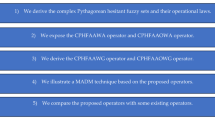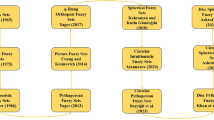Abstract
This paper presents a new hybrid modeling methodology suitable for complex decision making processes. It extends previous work on competitive fuzzy cognitive maps for medical decision support systems by complementing them with case based reasoning methods. The synergy of these methodologies is accomplished by a new proposed algorithm that leads to more dependable advanced medical decision support systems that are suitable to handle situations where the decisions are not clearly distinct. The methodology developed here is applied successfully to model and test two decision support systems, one a differential diagnosis problem from the speech pathology area for the diagnosis of language impairments and the other for decision making choices in external beam radiation therapy.
Similar content being viewed by others
References
Aird E (1989) Radiotherapy today and tomorrow—an introduction to optimisation of conformal therapy. Phys Med Biol 34:1345–1348
Brasil LM, de Azevedo FM, Barreto JM (2001) Hybrid expert system for decision supporting in the medical area: complexity and cognitive computing. Int J Med Inform 63:19–30
Dvořák J, ŠedaM (2004) Comparison of fuzzy similarity measures. In: Proceedings of 3rd international conference APLIMAT 2004, Slovak Technical University, Bratislava, Slovakia, pp 387–392
Georgopoulos VC (1997) A proposed electro-optical implementation of lateral inhibition with phase-only filters. Microw Opt Technol Lett 15:98–102
Georgopoulos VC, Stylios CD (2003) Augmented fuzzy cognitive maps based on case based reasoning for decisions in medical informatics. In: Proceedings BISC FLINT-CIBI 2003 international joint workshop on soft computing for internet and bioinformatics, University of California, Berkeley, California, USA, 15–19 December 2003
Georgopoulos VC, Stylios CD (2004) Augmented fuzzy cognitive mapssupplemented with case based reasoning for advanced medical decision support. In: Nikravesh M, Zadeh LA, Kacprzyk J (eds) Soft computing for information processing and analysis, pp 391–405
Georgopoulos VC, Malandraki GA, Stylios CD (2003) A fuzzy cognitive map approach to differential diagnosis of specific language impairment. J Artif Intell Med 29:261–278
Kamhi AG, Catts HW (1986) Toward an understanding of developmental language and reading disorders. J Speech Hear Disord 51: 337–347
Kandasamy WBV, Smarandache F (2003) Fuzzy cognitive maps and neutrosophic cognitive maps. Xiquan, 510 E. Townley Ave, Phoenix, USA, ISBN 1-9931233-76-4
Karacapilidis N, Pappis C (2000) Computer-supported collaborative argumentation and fuzzy similarity measures in multiple criteria decision making. Comput Oper Res 27:653–671
Khan FM (1994) The physics of radiation therapy, 2nd edn. Williams and Wilkins, Baltimore
Krasswski E, Plante E (1997) IQ variability in children with SLI: implications for use of cognitive referencing in determining SLI. J Commun Disord 30:1–9
Krekelberg B, Kok JN (1992) A lateral inhibition neural network that emulates a winner-takes-all algorithm. RUU-CS (Ext r no 92–46), Utrecht
Leonard LB (2000) Children with specific language impairment. MIT Press, Cambridge
Liao TW (2001) Classification and coding approaches to part family formation under a fuzzy environment. Fuzzy Sets Syst 122: 425–441
NICHCY (2004) Reading and learning disabilities. Briefing paper (FS17), 4th edn. National Dissemination Center for Children with Disabilities, Washington
Papageorgiou E, Stylios C, Groumpos P (2003) An integrated two-level hierarchical system for decision making in radiation therapy using fuzzy cognitive maps. IEEE Trans Biomed Eng 50:1326–1339
Sackett DL, Straus SE, Richardson WS, Rosenberg W, Haynes RB (2000) Evidence-based medicine: how to practice and teach EBM, 2nd edn. Churchill Livingstone, Edinburgh
Schmidt R, Pollwein B, Gierl L (1999) Experiences with case-based reasoning methods and prototypes for medical knowledge-based systems. In: Horn W et al. (eds) AIMDM’99, LNAI, vol 1620, pp 124–132
Sprogar M, Lenic M, Alayon S (2002) Evolution in medical decision-making. J Med Syst 26(5):479–489
Stylios C, Georgopoulos P, Groumpos P (2001) Using fuzzy cognitive maps for decision making in external beam radiation therapy. In: Proceedings NNESMED 2001, 4th international conference neural networks and expert systems in medicine and healthcare, Milos Island, Greece, pp 20–22
Tallal P, Stark R, Mellitis E (1985) Identification of language-impaired children on the basis of rapid perception and production skills. Brain Lang 25:351–357
Author information
Authors and Affiliations
Corresponding author
Rights and permissions
About this article
Cite this article
Georgopoulos, V.C., Stylios, C.D. Complementary case-based reasoning and competitive fuzzy cognitive maps for advanced medical decisions. Soft Comput 12, 191–199 (2008). https://doi.org/10.1007/s00500-007-0194-7
Published:
Issue Date:
DOI: https://doi.org/10.1007/s00500-007-0194-7




